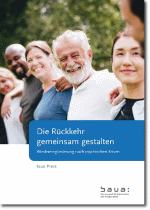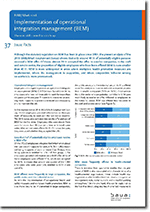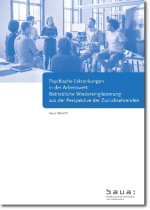The pathway from treatment to workplace reintegration
The longer an employee is absent because of illness, the more difficult it is for them to start doing their job again. An integrated RTW process that brings together internal and external actors helps employees make the transition back to working life in sustainable manner.

RTW stands for structures, measures and activities that enable a timely return to work after any long-term sickness absence. Ideally, this RTW process already begins while the employee is still on sickness absence and goes much further than just operational integration management (OIM). In many cases, returning with a gradual reintegration is helpful.
A comprehensive RTW process is centred on the returning employee. The process is a communicative dialogue between the person who has been off work, the key RTW stakeholders in the workplace, the physicians providing treatment, and any therapists who may be involved.
The main goals of a coordinated RTW process are:
- more favourable health trajectories and
- a sustainable return to work.
From the point of view of the returning employee, the RTW process is an essential aspect of coping with their illness. Seen from an operational point of view, it is a process of communication about the conditions for RTW and the configuration of the working environment, but also an organisational development process.
Above all, social support from colleagues and supervisors is an important factor in successful RTW.
A variety of helpful information for operational RTW practice is provided by the baua:Guidance brochure Managing RTW Together (Die Rückkehr gemeinsam gestalten) with its in-depth fact sheets.
OIM: a statutory obligation and essential element of sustainable RTW
Since 2004 German employers have been obliged to offer operational integration management to employees who have been on sick leave for an extended period. OIM is voluntary for employees and serves to restore and maintain work ability and employability. OIM is anchored in law by Section 167(2) of the Ninth Book of the German Social Code (Sozialgesetzbuch, SGB). This stipulates that an employer has to offer OIM to all employees who are on sickness absence for more than six weeks, either consecutively or due to several absences, in the course of twelve months. Many organisations have some catching-up to do in this respect. Although offering OIM is a statutory duty for employers, it is offered to less than half of all the employees who are potentially entitled to it. However, take-up runs at almost 70%, which shows there is demand for it among employees (cf. BIBB/BAuA Fact Sheet 37, Implementation of OIM (Umsetzung des BEM).
OIM as a systemic process
Operational integration management stands for individual case management, as well as the development of teams and organisations. OIM aims to maintain good health and the best possible work ability. It helps those concerned to
- overcome existing deal with sickness absence,
- prevent future sickness absence and
- maintain and promote work ability in the long term.
Systemic OIM operates at four levels of work ability:
- at the medical level with a focus on the maintenance of performance,
- at the mental level with a focus on motivation and self-efficacy,
- at the social level with a focus on support from professional helpers, supervisors, and colleagues, and
- at the organisational level with a focus on the development of support structures and the adaptation of work requirements and/or conditions.
In addition, an appropriately organised OIM process makes it possible for early diagnosis and rehabilitation to be linked together, in particular when support from within (and beyond) the organisation is arranged at an early stage in cases of repeated sickness absences. Apart from this, the experience of OIM that has been gained can be drawn on to help prevent chronic diseases.
The OIM process
A systematic approach is recommended if operational integration management is to be implemented successfully. The following steps need to be considered in this context:
Typical OIM procedure
- Identification of incapacity for work > six weeks within the last twelve months
- Letter with invitation to initial interview
- OIM consultations
- Implementation of interventions
- Final consultation and reflection
- Optional sustainability consultation
The four-phase reintegration model – a systemic and systematic approach
The four-phase reintegration model was developed for the RTW process following mental health crises, but is also a source of good suggestions for other situations. It forms a clearly structured process for sustainable reintegration into the workplace. The first two phases prepare the RTW process. Phase 1 (co-orientation) involves building up a trusting working relationship and solution-oriented dialogue about the interventions and resources necessary for the employee’s forthcoming RTW. Phase 2 (coordination) is concerned with the organisational preparation and coordination of these interventions. The remaining phases deal with the RTW process and the implementation of the interventions that have been prepared. Phase 3 (cooperation) covers the employee’s return and the ongoing review and adaptation of interventions and resources during RTW. Phase 4 (renewed co-orientation) concentrates on how to sustainably secure the employee’s performance and work ability.





